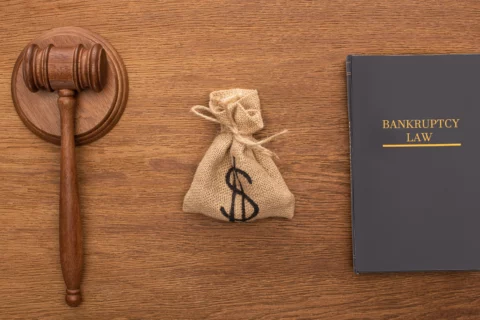What to Know About Chapter 7 Bankruptcy?
Bankruptcy is a complex subject matter. There are several types of bankruptcies among them, Chapter 7 and Chapter 13, both of which are classified as personal bankruptcies. Which is the best for your situation? Here is some information on bankruptcy Chapter 7.
Getting A Fresh Start Through Bankruptcy
 Bankruptcy is prepared to give a fresh start to those drowning in debt. Frequently, individuals make terrible financial judgments. Occasionally, some people also find themselves in financial hardship through no fault of their own. A family member’s critical sickness, a wage earner’s layoff, or other unforeseen occurrences can swiftly push a family into financial difficulty.
Bankruptcy is prepared to give a fresh start to those drowning in debt. Frequently, individuals make terrible financial judgments. Occasionally, some people also find themselves in financial hardship through no fault of their own. A family member’s critical sickness, a wage earner’s layoff, or other unforeseen occurrences can swiftly push a family into financial difficulty.
Bankruptcy is a legal procedure designed to assist debtors (individuals who owe money) in gaining relief from unpayable obligations while also assisting creditors (individuals who owe money) in obtaining payment from whatever property or assets the debtor possesses are not necessary for survival.
Choosing to file for bankruptcy is a difficult one. You may be overwhelmed and believe that bankruptcy is your only choice. However, use caution while deciding since filing bankruptcy may affect your life too.
As such, it is vital to keep the services of a Chicago Bankruptcy Attorney. Additionally, bankruptcy does not eliminate all debt, and many forms of debt are not dischargeable (eliminated) in bankruptcy.
To evaluate whether or not to declare bankruptcy, it would help to ask your bankruptcy lawyer the following questions:
- What options to bankruptcy do I have?
- Which bankruptcy proceeding is the best solution for me? and
- Which obligations are discharged (absolved) in bankruptcy?
Bankruptcy is controlled by federal law, which means that the process is uniform across the country. However, each state’s exemptions may vary (assets you can keep even when filing for bankruptcy).
What type of bankruptcy is chapter 7?
Typically, Chapter 7 bankruptcy has been the most prevalent kind of bankruptcy. Chapter 7 bankruptcy is one of the three basic types of bankruptcy relief available under the bankruptcy legislation.
- It is open to individuals, partnerships, corporations, and other business entities.
- It is distinguished from Chapter 13 and Chapter 11 bankruptcy plans by the fact that it is a liquidation bankruptcy, whereas the other two are reorganization bankruptcy plans.
- This type of bankruptcy has a “means test”.
You must earn less than a set sum. Ask a lawyer whether you qualify. This type of bankruptcy cannot be filed if you have had a bankruptcy filing in the last six years.
- In Chapter 7, your non-exempt, unsecured assets will be liquidated and converted to cash, with the profits used to cover the costs of the case and to repay your creditors.
The majority of debts that cannot be repaid through the sale of all of your assets are discharged—that is, removed.
Additionally, the bankruptcy filing results in an automatic suspension of creditors’ collecting operations. This is a significant comfort for besieged debtors. However, debtors should be mindful that creditors, particularly those with unpaid secured claims, may seek to have the automatic stay withdrawn if foreclosure or repossession is a certain conclusion.
When Can You File for Bankruptcy Under Chapter 7?
There are various indicators that you should file for Chapter 7 bankruptcy. The following are five significant indicators that filing for Chapter 7 may be the best option:
- Your obligations exceed half of your annual income.
- Even if you took exceptional efforts, it would take five years (or more) to pay off your debt.
- Your debt puts a strain on essential elements of your life, such as your relationships and your capacity to sleep.
- You have little to no spare cash.
- Your monthly salary is less than the state’s median.
Check out this chart for a short summary of what is Bankruptcy Chapter 7.
Who can file?
|
Qualifying limits
|
How long does it take to obtain a discharge?
|
What happens to assets in bankruptcy?
|
Allows eliminating unsecured junior liens from the real property by lien stripping?
|
Allows decreasing the principal loan balance on secured obligations through a loan cramdown?
|
Gains
|
Limitations
|
Learn More: Chapter 7 Bankruptcy: When and How to File
Other Bankruptcy Types Explained
There are other types of bankruptcy cases, each named after a chapter of the federal Bankruptcy Code.
- Due to its complexity, Chapter 11 is usually filed by corporations or partnerships, but individuals can file as well. Generally, the debtor retains his or her property and runs the business while trying to pay off creditors.
- With Chapter 12, the debtor keeps his or her property and works out a repayment plan with creditors.
- Individuals are the focus of Chapter 13. It is a repayment plan for regular earners. You keep your property and pay off your debts over a 3- to 5-year period. Chapter 13 bankruptcy requires that you have a certain amount of debt. Consult a lawyer about Chapter 13 bankruptcy.
Which Bankruptcy Should You File: Individual or Joint?
Married couples can file jointly or separately. In general, filing jointly makes sense if you have a lot of joint debts and your state doubles your bankruptcy exemptions.
Individual bankruptcy, on the other hand, may be in your best interests if you fall into one of the following categories:
- There is debt in only one spouse.
- One spouse may have separate nonexempt property that is at risk of being liquidated in bankruptcy (be mindful that in community property laws, all marital assets are deemed the property of the bankruptcy estate), or
- In a joint case, your state does not allow married couples to double their exemptions.
Final Thoughts
In the end, we hope that this article has helped you better understand the nature of bankruptcy, its advantages, and its disadvantages. Speaking with a bankruptcy attorney from Cutler and Associates LTD will help you gain a better understanding of the kind of bankruptcy best suited to your unique situation.
With their help, you should be able to make an informed decision about what steps to take next. To discover more about the types of bankruptcies available or any other aspect of Illinois’ bankruptcy laws, call us today.


